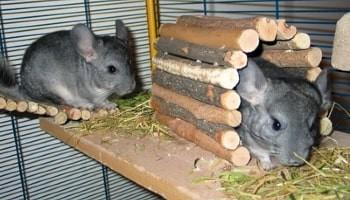They will need:
- Easy access to the things they need - such as space to jump and run, safe hiding and resting places, a dust bath, water and food.
- To sleep undisturbed for long periods during daytime. They're more likely to be sociable and feed at night, and they'll need 12 hours of darkness.
- Safe wooden toys to play with and chew.
- Social contact - chinchillas are sociable, so they'll need opportunities to interact with friendly chinchillas and people. You should house them together with one or more friendly chinchillas.
- Not to be handled too much - chinchillas can learn to enjoy being with familiar people and being petted, but tend not to enjoy being handled and often struggle when picked up. They're curious creatures, using their mouths to explore and chew items around them.
- Daily exercise - chinchillas are active animals and need regular exercise to stay fit and healthy.
- Resting areas - they'll need constant access to hay-filled nest boxes where they can rest and sleep.
- Hiding places - chinchillas are a prey species and must be able to avoid things that scare them, such as the sight or smell of predators like dogs, cas or ferrets. Give them hiding places where they can go to get away from companions or escape if they feel scared, and make sure there are enough nest boxes and hiding places for at least one each. Give them at least one box large enough for them all to rest together.
Keeping an eye on your chinchillas' behaviour
As well as these basics, you'll also need to keep a close eye on your chinchillas' behaviour. If it changes, or you notice regular signs that they're stressed or scared, ask a vet or clinical animal behaviourist - they could be distressed, bored or injured.
Chinchillas' behaviour depends on their age, personality and past experiences. When they're frightened or in pain, chinchillas may change their behaviour or develop unwanted habits, such as aggression or hiding.
Signs that your chinchillas may be suffering from stress or fear can include:
- Making noises, such as barking or whistling
- Hiding
- Chewing fur - either their own or another chinchilla's
- Patches of fur coming away when handling them
- Changes to feeding or toileting habits
- Over-drinking or playing with the water bottle
- Reluctance to move
- Repetitive movements such as racing back and forth on the bottom of the cage
If your chinchillas' behaviour becomes an ongoing problem, get expert advice.
Treating your chinchillas with kindness
Remember that your chinchillas have very sensitive hearing and are easily startled by loud or sudden noises, so be quiet and gentle around them and treat them with kindness. If you handle them, do so close to the ground, away from shelves and furniture that they may try jumping onto at the risk of hurting themselves. Never shout at or punish them, as they're very unlikely to understand and it may make them more nervous and scared.
Find out more about caring for your pet chinchillas.




